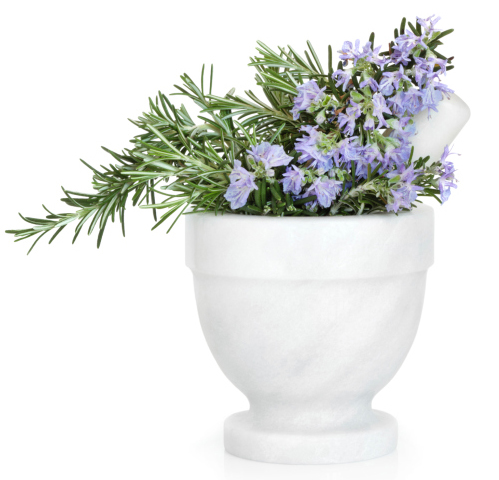Rosemary Improves Memory and Cognition


“There’s rosemary, that’s for remembrance.” —Ophelia in Shakespeare’s Hamlet. Although poor Ophelia was mad, she appears to have been spot on in her association of rosemary with better memory.
Despite its name, rosemary is not related to roses but, rather, takes its name from ros, which means dew in Latin, and marinus, which means “of the sea”.
The herb was said to have clung to the goddess Aphrodite when she arose from the sea foam in her mythological birth.
This “dew of the sea,” which is native to the Mediterranean area, is now cultivated in many areas of the world.
Inhaling Rosemary Improves Cognitive Function
Rosemary’s distinctive and slightly medicinal fragrance is not easily forgotten. Its use in aromatherapy was recently validated by studies that showed improvement in cognitive function in Alzheimer’s disease patients as well as an anti-anxiety effect in students taking tests.
A study of 40 adults found that the inhalation of rosemary’s aroma increased alertness.
Inhaling the fragrance of rosemary essential oil has even been shown to increase the body’s free radical scavenging activity and lower salivary cortisol levels.
Cortisol is a hormone that regulates the body’s response to stress.
Rosemary Contains Memory-Boosting Compounds
Rosemary contains the phytochemicals rosmarinic acid, camphor, caffeic acid, and the antioxidant compounds, carnosic acid and carnosol. Of rosmarinic acid, a recent review listed anti-inflammatory, antiviral, antibacterial, antidepressant, and anticancer properties.
Rosmarinic acid’s anti-amyloid and antioxidant properties demonstrate its neuroprotective ability. Amyloid-beta is the abnormal protein implicated in Alzheimer’s disease.
In rats treated with the memory-impairing drug scopolamine, rosemary extract inhibited acetylcholinesterase (the enzyme that breaks down the neurotransmitter acetylcholine) as well as improved long-term memory.
In other research, derivatives of the rosemary compound carnosic acid were shown to play a role in acetylcholinesterase inhibition.
In research involving mice, those that received the highest dose of rosemary extract (which contained 60% carnosic acid) experienced the greatest memory benefit, accompanied by a reduction in a marker of oxidative stress in the brain.
 Rosemary Extract Reduces Brain Inflammation
Rosemary Extract Reduces Brain Inflammation
Rosemary is a significant source of the flavonoid luteolin, which has been shown to help improve memory in animal research.
In a study funded by the National Institutes of Health, luteolin increased spatial working memory (the type of memory involved in spatial orientation) in aged mice in comparison with controls, while reducing markers of inflammation in the brain’s hippocampus, an area involved in memory.
The Bottom Line
Rosemary’s association with memory has been known since before the Elizabethan age. Science is only now beginning to validate what humans had discovered through trial and error centuries ago.
While rosemary has long been used as a seasoning in many dishes, the herb is now presenting itself as a promising candidate for drug discovery. Since its pungent taste naturally limits the amount one can add to food, it is best to seek out supplements that contain an extract of the herb or one or more of its active components.
For aromatherapy uses, rosemary essential oil or a plant grown on your windowsill is all you need.
